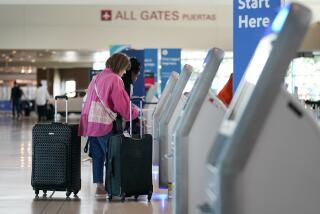Fussing With the FAA
- Share via
A new report on air travel turns out to be a hit-and-miss affair. It hits the problems of airline regulation squarely on the mark. But its proposed solution misses completely the basic flaw in the way government deals with commercial aviation.
The report is from a national commission that concludes after a 10-month study, as Chairman Jack Albertine put it, that the system is being held together by a combination of punishing passengers with endless delays and “heroic” efforts of air-traffic controllers and others. They got that right.
But its most important recommendation is to pull airline regulation not only out of the federal Transportation Department but out of government altogether. And over time that would just aggravate a regulatory failure that existed long before there was such a thing as a Transportation Department: Because the Federal Aviation Administration is supposed to regulate and promote aviation, too many of its close calls favor commercial aviation.
Congress gave a single department the responsibility for federal air, road and rail programs 20 years ago. The still-valid premise was that no matter what their differences planes, trains, trucks, buses and cars were all ways to travel and transportation should be planned as a total system, making it easier to move from one form to another.
One of the merged agencies was the FAA, but it brought the regulatory problem to the department, not the other way around. Its top men spoke the same language as airline executives; both were more comfortable with each other than they were with common travelers. Their internal management style was heavy-handed then and remains so today, which led not only to a restive work force but an excess of bureaucracy.
But those are problems that must be solved with stronger direction from the top, not by cutting the FAA entirely free of government and, in effect, moving it even closer to the industry it regulates, as the 10-member commission proposes.
The proposal comes perilously close to the parody of libertarian thinking that says if you feel threatened you should hire a bodyguard and not make people pay taxes to support a big police force.
The commission would disconnect the agency from civil service, move it out from under the Office of Management and Budget, make it independent of the Transportation Department and make it self-supporting with a flow of fees, including perhaps a fee on tickets.
The report reflects a fundamental tenet of 1980s conservatism: Government cannot do anything right and so really important jobs must be handed over to private industry.
The commission also proposed stiffer aircraft inspections, a tighter code for commuter airlines, improved equipment on small planes so that traffic controllers could keep better track of them on radar and other changes in rules, none of which requires such drastic change as pulling the FAA out of government.
Certainly the regulatory systems needs to work more smoothly, but that it does not is as much a failure on the part of Congress, which presumably dictates policy for the federal government, as it is for the executive branch.
Transportation Secretary James Burnley is right when he says that a public service on the scale of commercial aviation must be regulated by government. Burnley thinks that the routine work of air-traffic control could be contracted out or performed by a federal corporation. That certainly is worth pursuing. So is what seems to be the novel notion in Washington of making the FAA’s managers do the job they were hired to do or replacing them with managers who will.
More to Read
Inside the business of entertainment
The Wide Shot brings you news, analysis and insights on everything from streaming wars to production — and what it all means for the future.
You may occasionally receive promotional content from the Los Angeles Times.










